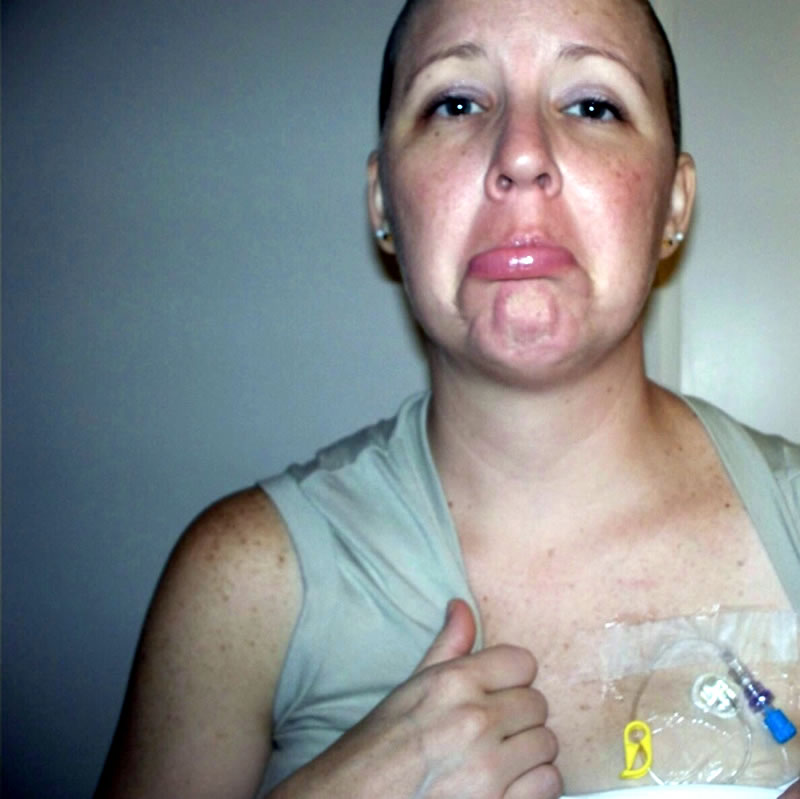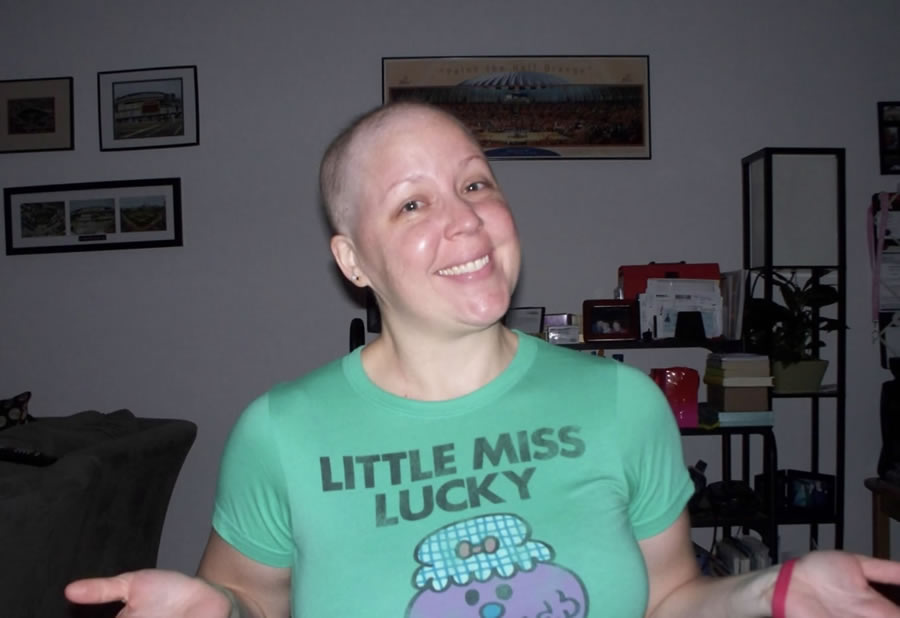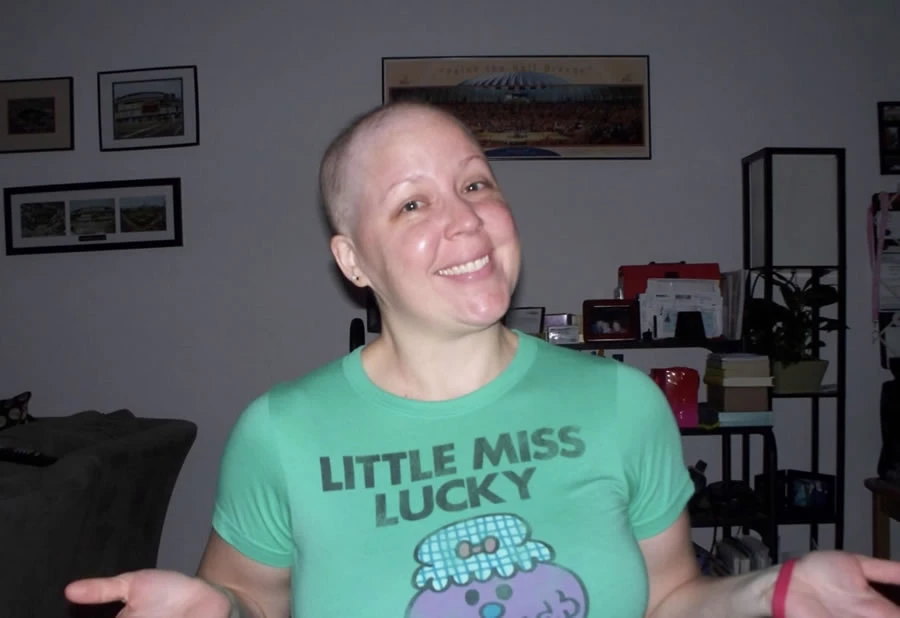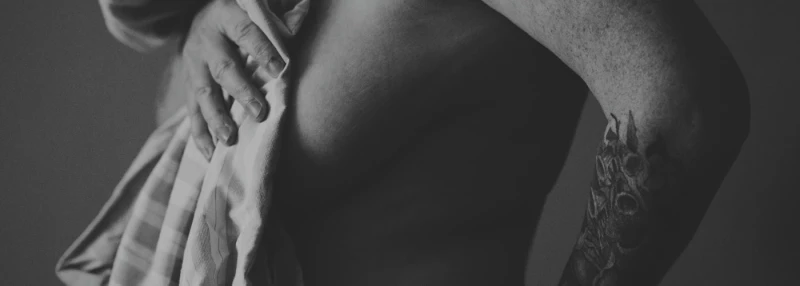When a doctor tells you that you have cancer, the words can form an invisible scar on your brain and your mental state. Those scars don’t always show up to the human eye. Cancer has a knack for leaving physical scars, too. We’re never prepared to hear a cancer diagnosis, let alone to someday have scars on our bodies left by cancer. It can be very overwhelming.
Bilateral Mastectomy: A Courageous Decision?
When I was diagnosed with breast cancer 8 years ago, I made, as some have said to me, the “courageous” decision to have a bilateral mastectomy, which means removing both of my breasts. I still don’t know what is so courageous about removing cancer-riddled breasts, but I would just nod and say thanks.
I’ll never forget the day I woke up from that surgery and looked down to see what I assumed was a flat chest behind the mounds and mounds of gauze and bandages. Once I was healed enough from the surgery, the big reveal took place at my plastic surgeon’s office. Let’s see what is behind bandage number 1! Yes, it felt like I was a gameshow contestant on the show “This Is Your Breast Cancer Life!” Oh lucky me.
I stood there in disbelief, which kind of makes me laugh because I knew the surgery I had gone through. Yet, it’s still hard to see your body when it’s complete. There I stood with two 6-inch, jagged incisions with screaming black thread holding my skin together.
I had opted for immediate breast reconstruction so there were two basically flat implants in there, although it was almost impossible to notice. I stared in the mirror. The person staring back was someone I thought I recognized with the exception that she was a 32-year-old woman with a flat chest showcasing bruised, lacerated, resemblances of emptiness where breasts once laid. It was almost impossible to look at.

My Breast Cancer Life
Fast forward a bit. I went through the process of having my temporary implants filled each week and stretched to the size I wanted. Then I had them replaced with permanent implants that from the outside look completely normal. No one would know the difference if they saw me on the street. So, as a band-aid to my mindset, that seemed to help me move on with my life after breast cancer, sort of.
My pre-breast cancer life was not filled with much body drama. I didn’t go through my teen years hating how I looked or wishing my breasts were a different size. I didn’t think my body was this evil thing that carted me around through my daily tasks. I treated my body like a friend. I took care of it. It hadn’t failed me for almost 32 wonderful years.
So, on that July day when I got the news that this friend of mine, this body I trusted had gotten itself cancer, it was almost more than I could handle.
After breast cancer, I started a real dislike of my body. I certainly didn’t trust it. I mean, come on! If failed me big time!! How could it get cancer like that? Those scars across my chest were constant reminders of what cancer had taken from me long after my hair grew back in erasing any other physical tell-tails to anyone on the outside that I had had cancer. I didn’t see them as battle wounds. I saw them as body failure. I missed my old breasts. I missed my old body. How was I ever going to heal on the inside from this cancer beast that was slowly eating away at my mental state?
Find Support
Anger Comes Before Acceptance
I started treating my body with anger. I constantly felt around for lumps and bumps. Did I miss a new one? Was the cancer back? Were there enlarged lymph nodes that screamed cancer? I felt around my breast implants, my scars, my armpits and my neck. I felt around ALL the time. I didn’t trust my body anymore to take care of itself. I lived my life in constant fear of the cancer returning. Mirrors were my enemy. I didn’t want to see the post-cancer me. Those scars would always stare back as if laughing. They knew what they were doing to me physically and mentally. The scars showcased themselves plain as day on my body, but they were also seeping into my mind. Cancer was playing a sick game with me and I was letting it win.
I wish I could say that I just snapped out of it, forgave my body and moved on. If only it was that easy. I got tired of not liking my body, not trusting my body, and never looking in the mirror. I got tired of looking for lumps all the time.
I got tired of not figuring out who I really could be in life, not as a cancer survivor but as a person.
My Body Didn't Fail Me

So, I got some help. I found the best way for me to remove the mental angst against my body was to talk it through with a professional. I went to a therapist who helped me see that my body didn’t fail me. It didn’t allow itself to get cancer.
My eyes were opened to something quite shocking to me: My body SAVED me from cancer. It had made the lump I felt during a routine exam. There it was. It was calling me to action. The dislike of my body almost faded instantly. I never thought of it that way.
The mastectomy scars? I’m still not their biggest fans, but I don’t despise them as much. I look at them now. I can see them in the mirror and not wince thinking of my old breasts. I still have a lot to learn about my body and the emotions that come with learning to trust it again after cancer. However, I tend to call it a friend more than a foe these days.
 Dana was diagnosed with stage 1 ER + breast cancer in 2010 at the age of 32 years old. She volunteers with Young Survival Coalition as an Illinois State Leader and RISE Advocate. After diagnosis and treatment, survivorship was the toughest challenge in her cancer journey. A focus on life after cancer helped her to co-found The Dragonfly Angel Society – Cancer Survivorship, which is a non-profit that helps cancer survivors find survivorship resources that suit them and get on with the “now what” of their life after cancer.
Dana was diagnosed with stage 1 ER + breast cancer in 2010 at the age of 32 years old. She volunteers with Young Survival Coalition as an Illinois State Leader and RISE Advocate. After diagnosis and treatment, survivorship was the toughest challenge in her cancer journey. A focus on life after cancer helped her to co-found The Dragonfly Angel Society – Cancer Survivorship, which is a non-profit that helps cancer survivors find survivorship resources that suit them and get on with the “now what” of their life after cancer.




